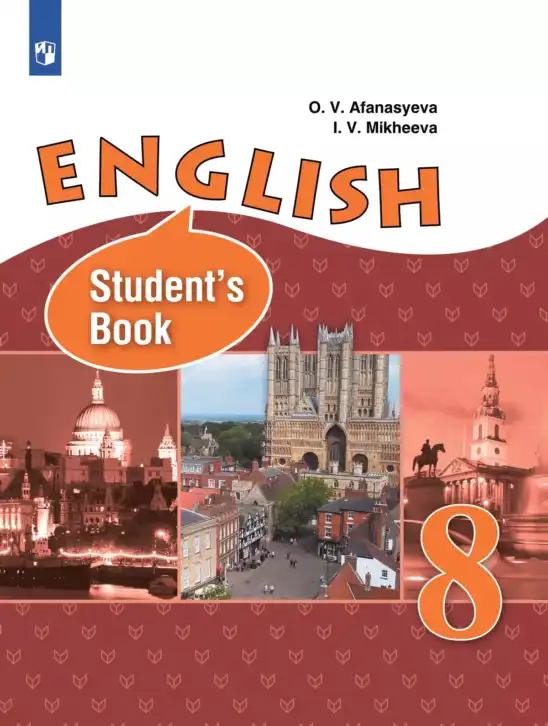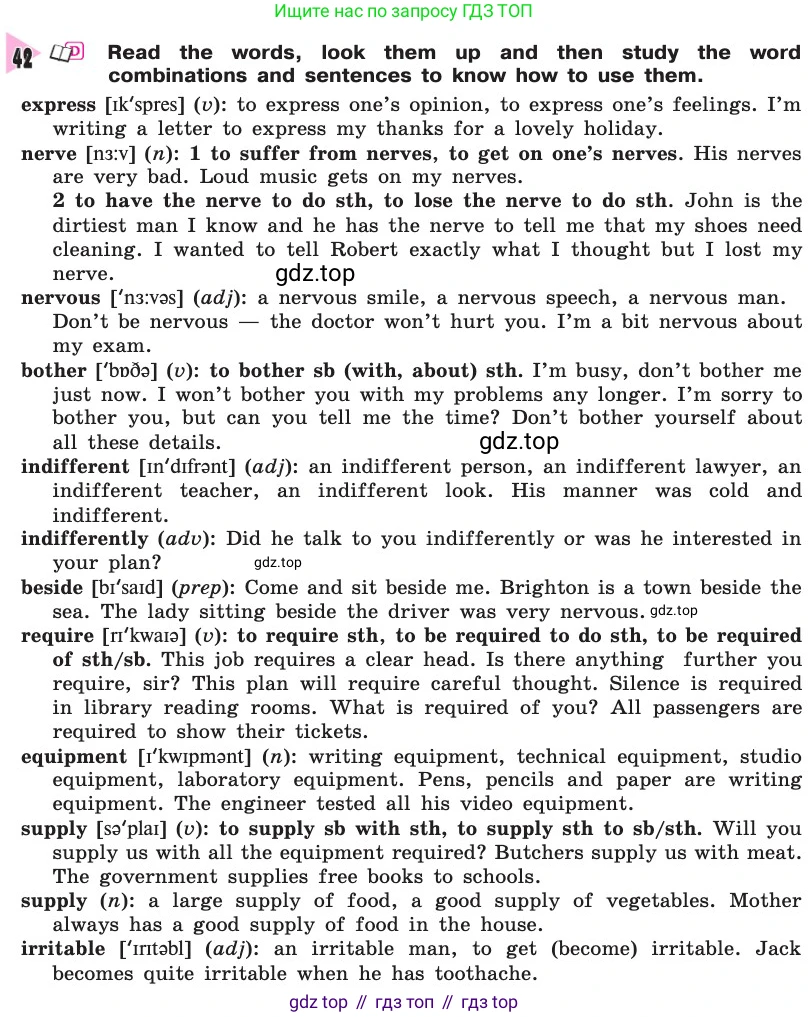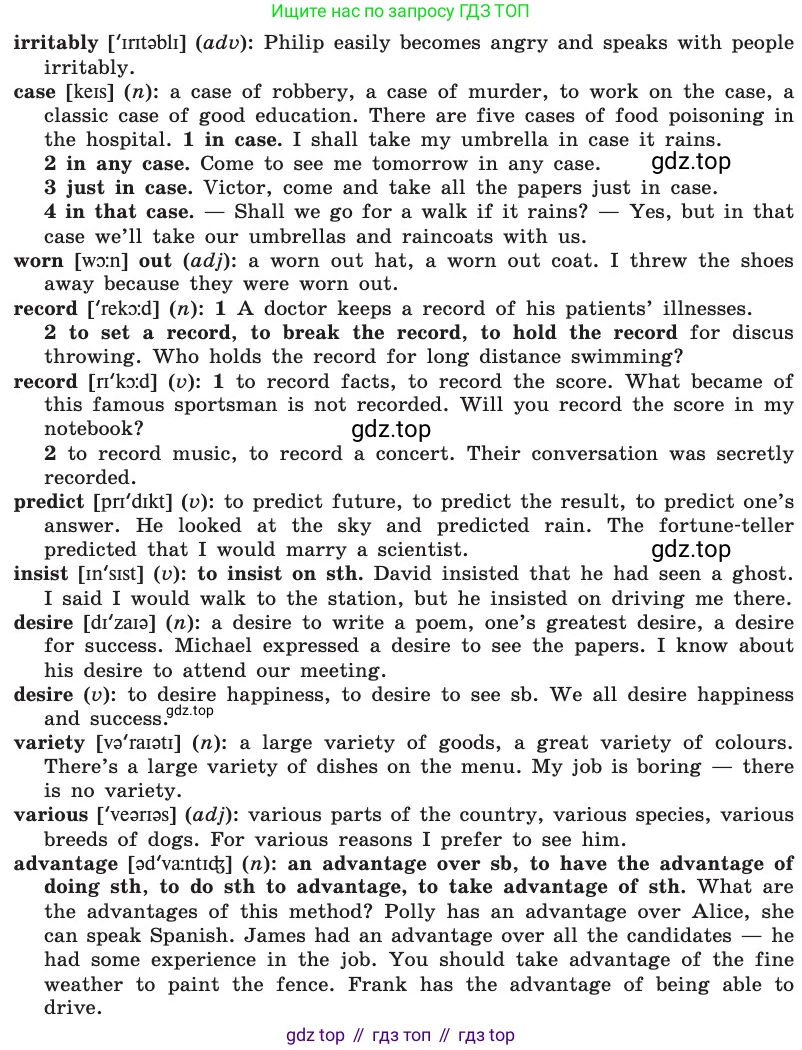Номер 42, страница 147 - гдз по английскому языку 8 класс учебник Афанасьева, Михеева

Авторы: Афанасьева О. В., Михеева И. В.
Тип: Учебник
Издательство: Просвещение
Год издания: 2014 - 2025
Уровень обучения: углублённый
Цвет обложки: белый
ISBN: 978-5-09-034201-8
Допущено Министерством просвещения Российской Федерации
Популярные ГДЗ в 8 классе
Unit 4. Fascination and Challenge: The World of Science and Technology. New Language. Vocabulary Section - номер 42, страница 147.
№42 (с. 147)
Условие. №42 (с. 147)
скриншот условия


42 Read the words, look them up and then study the word combinations and sentences to know how to use them.
express [ik'spres] (v): to express one's opinion, to express one's feelings. I'm writing a letter to express my thanks for a lovely holiday.
nerve [n3:v] (n):
1 to suffer from nerves, to get on one's nerves. His nerves are very bad. Loud music gets on my nerves.
2 to have the nerve to do sth, to lose the nerve to do sth. John is the dirtiest man I know and he has the nerve to tell me that my shoes need cleaning. I wanted to tell Robert exactly what I thought but I lost my nerve.
nervous ['n3:vəs] (adj): a nervous smile, a nervous speech, a nervous man. Don't be nervous — the doctor won't hurt you. I'm a bit nervous about my exam.
bother ['bɔðə] (v): to bother sb (with, about) sth. I'm busy, don't bother me just now. I won't bother you with my problems any longer. I'm sorry to bother you, but can you tell me the time? Don't bother yourself about all these details.
indifferent [in'difrənt] (adj): an indifferent person, an indifferent lawyer, an indifferent teacher, an indifferent look. His manner was cold and indifferent.
indifferently (adv): Did he talk to you indifferently or was he interested in your plan?
beside [bi'said] (prep): Come and sit beside me. Brighton is a town beside the sea. The lady sitting beside the driver was very nervous.
require [ri'kwaiə] (v): to require sth, to be required to do sth/sb. This job requires a clear head. Is there anything further you require, sir? This plan will require careful thought. Silence is required in library reading rooms. What is required of you? All passengers are required to show their tickets.
equipment [i'kwipmənt] (n): writing equipment, technical equipment, studio equipment, laboratory equipment. Pens, pencils and paper are writing equipment. The engineer tested all his video equipment.
supply [sə'plai] (v): to supply sb with sth, to supply sth to sb/sth. Will you supply us with all the equipment required? Butchers supply us with meat. The government supplies free books to schools.
supply (n): a large supply of food, a good supply of vegetables. Mother always has a good supply of food in the house.
irritable ['iritəbl] (adj): an irritable man, to get (become) irritable. Jack becomes quite irritable when he has toothache.
irritably ['iritəbli] (adv): Philip easily becomes angry and speaks with people irritably.
case [keis] (n): a case of robbery, a case of murder, to work on the case, a classic case of good education. There are five cases of food poisoning in the hospital.
1 in case. I shall take my umbrella in case it rains.
2 in any case. Come to see me tomorrow in any case.
3 just in case. Victor, come and take all the papers just in case.
4 in that case. — Shall we go for a walk if it rains? — Yes, but in that case we'll take our umbrellas and raincoats with us.
worn [wɔ:n] out (adj): a worn out hat, a worn out coat. I threw the shoes away because they were worn out.
record ['rekɔ:d] (n):
1 A doctor keeps a record of his patients' illnesses.
2 to set a record, to break the record, to hold the record for discus throwing. Who holds the record for long distance swimming?
record [ri'kɔ:d] (v):
1 to record facts, to record the score. What became of this famous sportsman is not recorded. Will you record the score in my notebook?
2 to record music, to record a concert. Their conversation was secretly recorded.
predict [pri'dikt] (v): to predict future, to predict the result, to predict one's answer. He looked at the sky and predicted rain. The fortune-teller predicted that I would marry a scientist.
insist [in'sist] (v): to insist on sth. David insisted that he had seen a ghost. I said I would walk to the station, but he insisted on driving me there.
desire [di'zaiə] (n): a desire to write a poem, one's greatest desire, a desire for success. Michael expressed a desire to see the papers. I know about his desire to attend our meeting.
desire (v): to desire happiness, to desire to see sb. We all desire happiness and success.
variety [və'raiəti] (n): a large variety of goods, a great variety of colours. There's a large variety of dishes on the menu. My job is boring — there is no variety.
various ['vɛəriəs] (adj): various parts of the country, various species, various breeds of dogs. For various reasons I prefer to see him.
advantage [əd'va:ntidʒ] (n): an advantage over sb, to have the advantage of doing sth, to do sth to advantage, to take advantage of sth. What are the advantages of this method? Polly has an advantage over Alice, she can speak Spanish. James had an advantage over all the candidates — he had some experience in the job. You should take advantage of the fine weather to paint the fence. Frank has the advantage of being able to drive.
Решение. №42 (с. 147)

Решение 2. №42 (с. 147)
42 Прочитайте слова, посмотрите их в словаре, а затем изучите словосочетания и предложения, чтобы узнать, как их использовать.
Ответ:
Okay, I have studied the words and how to use them. Here are some sentences I made up:
Хорошо, я изучил(а) слова и то, как их использовать. Вот несколько предложений, которые я составил(а):
1. I was very nervous before the exam, but my teacher was indifferent. - Я очень нервничал(а) перед экзаменом, но мой учитель был безразличен.
2. This job will require new equipment, which the company promised to supply. - Эта работа потребует нового оборудования, которое компания обещала предоставить.
3. He had a strong desire to set a record. - У него было сильное желание установить рекорд.
4. In this case, it's a big advantage to know the rules. - В данном случае знание правил является большим преимуществом.
Другие задания:
Помогло решение? Оставьте отзыв в комментариях ниже.
Присоединяйтесь к Телеграм-группе @top_gdz
ПрисоединитьсяМы подготовили для вас ответ c подробным объяснением домашего задания по английскому языку за 8 класс, для упражнения номер 42 расположенного на странице 147 к учебнику 2014 года издания для учащихся школ и гимназий.
Теперь на нашем сайте ГДЗ.ТОП вы всегда легко и бесплатно найдёте условие с правильным ответом на вопрос «Как решить ДЗ» и «Как сделать» задание по английскому языку к упражнению №42 (с. 147), авторов: Афанасьева (Ольга Васильевна), Михеева (Ирина Владимировна), углублённый уровень обучения учебного пособия издательства Просвещение.















